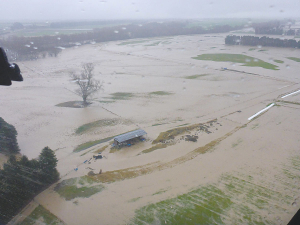The Taxpayers' Union is calling on the Government to prioritise reducing what it calls unnecessary and costly regulations for growers, farmers and businesses impacted by severe weather events earlier this year instead of providing taxpayer-funded handouts.
Yesterday, the Government announced a funding package for farmers and growers impacted by Cyclone Gabrielle, the Auckland Anniversary Weekend Floods, and Cyclone Hale.
The first part of the package will see the Government take 80% of the risk of a loan to a grower or farmer away from the banks in a move the Government claims will see banks able to offer reduced interest rates and more flexible terms.
The second component will see the Government lend up to $4 million to a grower or farmer if they are unable to secure a bank loan. To qualify, the individual would need to prove they can get their business back on track and that they can then get a bank loan.
Commenting on the recently announced support package, Taxpayers’ Union deputy campaigns manager Connor Molloy says that while the Union acknowledged that many farmers, growers and businesses have been severely affected by the recent weather events, the support package will reduce the long-term viability of the farming sector by leading to increased costs and regulations in the future.
“Rather than playing the role of the bank, the Government should be speaking with farmers to see what red tape needs to be cut to make it easier for these businesses to do what they do best,” Molloy says.
“Significant cutbacks to costly red tape would make farms more viable for the future and, in turn, would lead to an increased willingness for banks to lend right now,” he adds.
Molloy takes issue with the idea that the government is providing support that banks should be providing.
“The whole purpose of a bank is to take well-informed investment decisions that look not just at the immediate term but also, in many instances, decades into the future. If these farms are likely to be commercially viable in the future, banks will recognise this and adjust their lending conditions appropriately,” he says.
Molloy says banks are already fronting up the cash to pay loans to commercially viable farms.
“The only loans that the Government could underwrite that a bank wouldn’t otherwise provide are those that are inherently the most high-risk,” he says.
“If the Government really wanted to help farmers, they would start by cutting back on existing red tape that stops farmers getting on with the job and withdrawing their proposed replacement to the Resource Management Act, which would lead to even higher farming costs and even more red tape.”



















